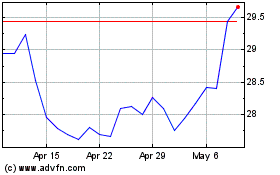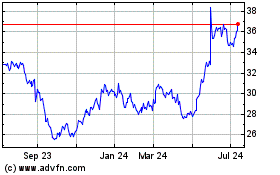Fujitsu Explores Sale of PC Unit To Rival Lenovo -- WSJ
October 07 2016 - 3:02AM
Dow Jones News
By Takashi Mochizuki
TOKYO -- Fujitsu Ltd. said Thursday that it was in talks to sell
its personal-computer arm to industry leader Lenovo Group Ltd., a
move that would accelerate the withdrawal of once-mighty Japan
electronics makers from the mass-market PC business.
Fujitsu has been trying to strip out noncore businesses to
improve profitability, and its shares closed up 5.7% in Tokyo
trading as investors welcomed the likely offloading of a
loss-making unit.
Beijing-based Lenovo accounted for 21.1% of global PC shipments
in the second quarter, followed by HP Inc.'s 20.7%, according to
IDC, while Fujitsu trailed far behind in ninth place with a share
of 1.1%.
Lenovo already acquired the PC business of another former
Japanese giant, NEC Corp., in 2011, and it took over the ThinkPad
PC business from International Business Machines Corp. in 2005.
A person familiar with the discussions said the Lenovo-Fujitsu
deal could be structured similarly to the NEC deal. Lenovo would
buy the majority of Fujitsu's PC subsidiary, which was spun off
from the Fujitsu parent in February, and Lenovo would lead the
business with Fujitsu retaining a minority stake, this person
said.
In a statement following Japanese reports about the deal,
Fujitsu said: "We are considering various options for the PC unit,
including a possible deal with Lenovo."
The global PC market has been shrinking as more consumers use
smartphones and tablets for internet access and communication.
Global PC shipments are expected to decline further this year to
256 million units -- down 30% from five years earlier -- according
to IDC.
Deal-making in the area has been active as the surviving PC
makers seek to reduce costs and branch out. Lenovo bought Motorola
Mobility in 2014 to improve its mobile presence, but its smartphone
business has since struggled.
NEC, Fujitsu and other Japanese makers made a push for global
domination in the 1990s, taking advantage of their control of what
was then a fast-growing domestic market. "Another Japanese invasion
is looming," wrote The Wall Street Journal in 1996, reporting on
big investments by NEC, Fujitsu, Toshiba Corp. and Sony Corp. to
sell PCs in the U.S.
But those hopes faded long ago amid competition from
less-expensive Chinese brands, and Fujitsu's last remaining bastion
was its shrinking home market of Japan.
Fujitsu Chief Executive Tatsuya Tanaka, facing pressure from
investors to improve profitability and slim down its business, has
tried to focus on higher-margin service businesses such as
organizing banks' computer systems or providing data to help
farmers grow crops more efficiently.
"The deal is a win-win," said Atsushi Osanai, a former Sony
employee who is now a visiting fellow at Harvard University.
"Fujitsu would be able to keep the brand name while Lenovo could
expand its presence in the enterprise business where the Japanese
company is strong."
Investors welcomed the Lenovo deal as a sign that Fujitsu was
taking steps toward "selection and concentration," said Yoshinori
Ogawa, a strategist at Okasan Securities.
Fujitsu already tried earlier this year to unload the PC
business in a proposed three-way merger with Toshiba's Dynabook
unit and Vaio Corp., the former Sony PC arm that is now owned by a
private-equity fund. The plan fell apart because none of the three
was ready to take leadership.
--Juro Osawa and Kosaku Narioka contributed to this article.
Write to Takashi Mochizuki at takashi.mochizuki@wsj.com
(END) Dow Jones Newswires
October 07, 2016 02:47 ET (06:47 GMT)
Copyright (c) 2016 Dow Jones & Company, Inc.
HP (NYSE:HPQ)
Historical Stock Chart
From Mar 2024 to Apr 2024

HP (NYSE:HPQ)
Historical Stock Chart
From Apr 2023 to Apr 2024
